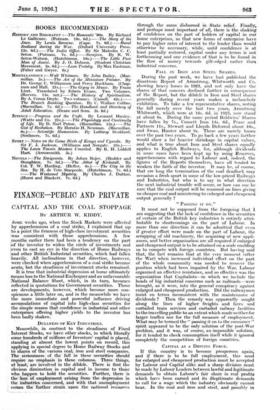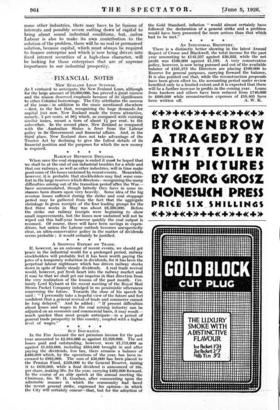FINANCE-PUBLIC AND PRIVATE
SOME weeks ago, when the Stock Markets were affected by apprehensions of a coal strike, I explained that up to a point the firmness of high-class investment securities was consistent with those apprehensions. A few months earlier there had been a tendency on the part of the investor to widen the circle of investments and even to cast an eye in the direction of Home Railways and other British Industrial securities, which had fallen heavily. All inclinations in that direction, however, were checked when apprehensions of a coal strike became acute, but the steadiness of investment stocks remained.
It is true that industrial depression at home ultimately means loss to the National Exchequer and an unfavourable National Balance Sheet, which, in its turn, becomes reflected in quotations for Government securities. Those are developments, however, which become more con- spicuous a little later on, and in the meanwhile we have the more immediate and powerful influence driving accumulations of capital into high-class securities for the simple reason that confidence in industrial and other enterprises offering higher yields to the investor has been badly shaken.
DULLNESS OF KEY INDUSTRIES.
Meanwhile, in contrast to the steadiness of Fixed Interest Stocks, we have other stocks, in which literally some hundreds of millions of Investors' capital is placed, standing at almost the lowest points on record, this applying in special degree to Home Railway Stocks and to shares of the various coal, iron and steel companies. The seriousness of the fall in these securities should require no emphasis in these columns. Three things, at least, are involved in the debacle. There is first the obvious diminution in capital and in income to thoSe who happen to hold the securities. Further, there is the loss of employment arising from the depression in the industries concerned, and with that unemployment comes the further strain upon the national resaure.f.s through the sums disbursed in State relief. Finally, and perhaps most important of all, there is the shaking of confidence on the part of holders of capital in our home enterprises, so that new forms of enterprise have to pay higher rates of interest to the lender than would otherwise be necessary, while, until confidence is at least partially restored, capital under any terms is not forthcoming and one evidence of that is to be found in the flow of money towards gilt-edged rather than industrial concerns.
FALL IN IRON AND STEEL SHARES.
During the past week, we have had published the disastrous Report of Armstrong, Whitworth and Co. showing heavy losses in 1925, and not only have the shares of that concern declined further in consequence of the Report, but the dibdele in Iron and Steel shares generally during recent years makes a melancholy exhibition. To take a few representative shares, noting the fall merely over the last two years, Armstrong Whitworth, which were at 16s. 6d. in 1925, now stand at about 6s. During the same period Baidwins' Shares have fallen by 7s., Consett Iron 14s. 6d., Pease and Partners lls. Stewart and Lloyds Deferred about 10s., and Swan, Hunter about 9s. -These are merely losses over the past two years. To go back a few years further would show a far heavier shrinkage in capital values, and what is true about Iron and Steel shares equally applies to English . Railways, for; although dividends in some eases have been kept up by using Reserves, apprehensions with regard to Labour and, indeed, the figures of the Reports themselves, have all tended to weaken the faith of the investor. It may be, of course, that ere long the termination of the coal deadlock may occasion a fresh spurt in some of the low-priced Railways and Industries, but who is to say in what direction the next industrial trouble will occur, or how can one be sure that the coal output will be resumed on lines giving us cheaper coal and ministering to enlarged and cheapened output generally ?
" PASSING IT ON."
It must not be supposed from the foregoing that I am suggesting that the lack of confidence in the securities of certain of the British key industries is entirely attri- butable to shortcomings on the part of Labour. In more than one direction it can be admitted that even if greater effort were made on the part of Labour, the scrapping of old machinery, the acquiring of new appli- ances, and better organization are all required if enlarged and cheapened output is to be attained on a scale enabling us to compete with foreign countries. But having said that, the fact remains that at the very moment (after the War) when increased individual effort on the part of the whole community was needed to recover the position which had been impaired by the War, Labour organized an effective resistance, and so effective was the organization that Capitalists-in which we include the heads of big industrial concerns such as railroads-were brought, as it were, into the general conspiracy against enlarged and cheapened production. Did the railwaymen insist on terms inconsistent with the maintenance of dividends ? Then the remedy was apparently sought along the lines of higher freights and fares and _curtailed train services and curtailed railway facilities to the travelling public to an extent which made neither for larger traffics nor for the full measure of employment. What may be termed the " passing it on to the consumer " spirit appeared to be the only solution of the post-War problem, and it was, of course, an impossible solution, for it tended to check consumption itself while it ignored completely the competition of foreign countries.
CAPITAL AS A DRIVING FORCE.
If this country is to become prosperous again; and if there is to be full employment, this need for enlarged and cheapened production must be accepted by Labour and Capital alike and a sharp division must be made by Labour Leaders between lawful and legitimate demands to obtain Labour's fair share in real profits which have been earned and its illegitimate demands to call for a wage which the industry obviously cannot bear. In the coal and iron and steel, and possibly in some Other fndUstries, there may have_ to be fusions of interests,,ak possibly severe cutting down of capital to bring nbOut sound industrial conditions,: but, _unless Labour is also to make., its own stontribution -to.. the solution of the problem, there will. be no real_ or permanent solution, because capital, whieh ,must always:be required to finance enterprise and which is'now being . driven int* fixed interest securities of a high-class - character, ' will be lacking_ for those enterprises that are of supreme: importance , to our industrial prosperity.











































 Previous page
Previous page